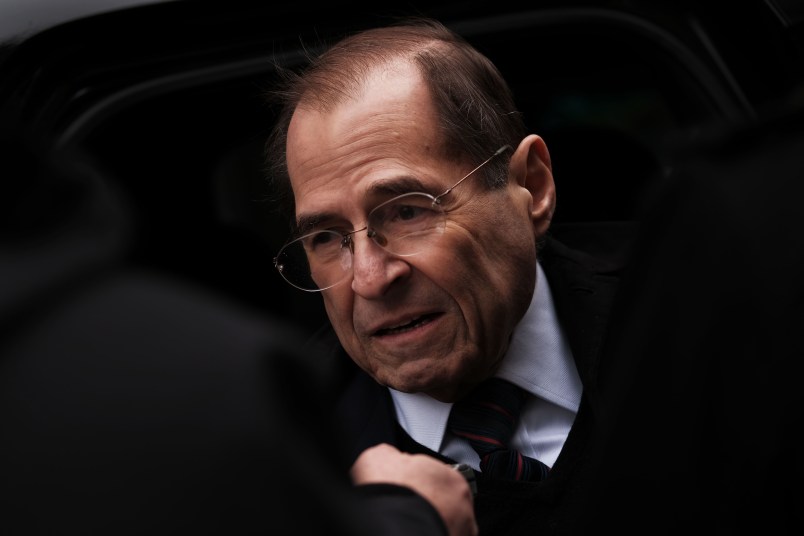Even as he blamed the Justice Department for ending negotiations around the production of the unredacted report from special counsel Robert Mueller, House Judiciary Chairman Jerry Nadler (D-NY) said in a letter to Attorney General Bill Barr on Friday that he was wiling to re-open those the discussions.
The letter went through Democrats’ version of events that culminated in the committee voting Wednesday to recommend that Barr be held in contempt, and noted that the Department, as that mark-up was starting, announced that President Trump was asserting executive privilege over the documents Democrats seek.
Nadler suggested that the executive privilege assertion was a “precipitous end to our active accommodation discussions” and a shift in Justice Department strategy that seemed reflective of Trump’s declaration that he is “fighting all subpoenas.”
In comments after the committee vote Wednesday, Nadler said that a floor vote to hold Barr in contempt would be happening “rapidly” though he couldn’t say exactly when.
In his letter to Barr on Friday, however, Nadler noted that “the full House has not yet taken action on this matter.”
“The committee stands ready to resume the accommodation process to attempt to reach a compromise,” the lawmaker said.
The letter said that among the accommodations that Democrats had offered was a willingness to reduce the number of members who could see the full unredacted report — from the entire Congress to just the Judiciary and Intelligence Committees. That would be on top of the group of 12 lawmakers the Department has already said could view a less redacted version of the public report.
Additionally, Nadler said that Democrats are willing to consider narrowing their request for the specific underlying investigative materials that they also are seeking via subpoena.
“Our offer stands to limit our request for underlying evidence to those materials referenced in the report and to prioritize a discrete and readily identifiable set of the documents so reference in the report — such as witness interviews reports and contemporaneous notes taken by witnesses of relevant events — if the Department is ready to resume the accommodation process,” Nadler said.
A major sticking point in the dispute is that the Democrats’ request to see the grand jury materials that were withheld in the public report — a federal law known as “Rule 6(e)” requires that those materials remain confidential. The Department has accused Democrats of asking Barr to break the law with their subpoena for those materials; Democrats say that they’re just calling on Barr to join them in a seeking a court’s permission that they be disclosed, as judges are allowed to approve in certain circumstances under the law.
“Importantly, the dispute over the redactions on Rule 6(e) ground provides no basis for the Department to refuse to produce any of the evidence and investigatory materials required by the subpoena,” Nadler said. “In fact, if the Department engaged in a good faith accommodation process and produced the limited set of documented and materials prioritized by the Committee, other than those for which the Department believed it could now because of Rule 6(e) or court order, it would not have been necessary to begin the contempt process.”
Read the letter below:



